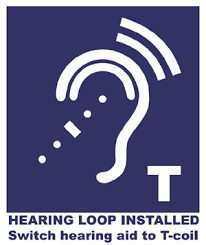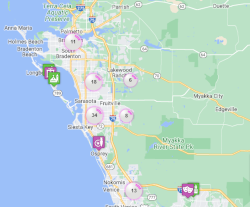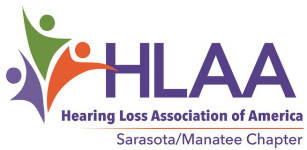HEARING LOOP ADVOCACY
Let’s Loop SRQ! is our chapter’s advocacy effort to get hearing loop systems into local public venues to increase access for the 145,000 people in Sarasota and Manatee Counties with hearing loss. Our efforts have resulted in more than 120 venues in the two-county area having loop technology.
Hearing loop systems are the ideal solution for people who wear hearing aids or cochlear implants to hear better in theaters, churches, banks, restaurants, and many other public places. A hearing loop is the only system that sends the sound of a voice or instrument from a microphone directly into a hearing aid or cochlear implant for the clearest, most superior sound currently possible.
What is a Hearing Loop?
A hearing loop is a wire that circles a room and is connected to a sound system. The loop transmits the sound electromagnetically. The telecoil in the hearing aid or cochlear implant picks up the electromagnetic signal. The hearing loop connects the listener directly to the sound source, while most background noise is eliminated.
A telecoil in a hearing aid functions as a wireless antenna that links to the sound system and delivers customized sound to the listener. A telecoil is a small copper coil that is an option in most hearing aids and is built into cochlear implant processors.
If you are buying a hearing aid for the first time, be sure to ask that a telecoil be included to expand the functionality of your hearing aid.

How to Use a T-Coil
Nearly 90% of all new hearing aids come equipped with a telecoil. The primary exceptions are the tiny aids, especially the all-the-way-in-the-ear models, which do not have the space for one. A good rule of thumb is that overall hearing aid performance increases with the aid size.
Most T-Coils are accessible by flipping a switch on your hearing aid. In a few cases, the T-Coil is automatically engaged in the presence of a hearing loop system. In some other cases, your audiologist needs to activate your T-Coil before you can access it.
Three Helpful Apps for Identifying Looped Locations
Now, two great websites will tell you about looped locations wherever you go!
Loopfinder is partnered with HLAA and can hone in on sites by category or location. The website is http://www.loopfinder.com/.
Also, the Assistive Listening Device Locator is equally helpful. It will tell you if the venue has a loop, infrared, or FM. Visit the site at http://www.aldlocator.com/.
To check for looped locations throughout Florida visit https://completehearingsolutions.org/hearing-looped-locations/

Local Venues with Hearing Loops
Click on the link below to see the more than 170 venues looped in the Sarasota/Manatee area, including theaters, medical offices, community venues, churches, and synagogues!
